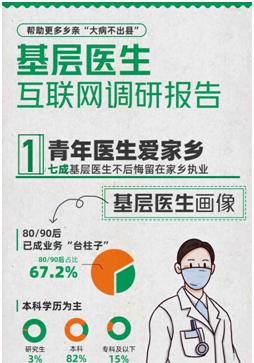On December 15, Alibaba Health Research Institute released the "Grassroots Doctors Internet Research Report", which shows that grassroots doctors believe that talents and management concepts are the biggest shortcomings faced by grassroots medical care, and lack of training opportunities and poor treatment are the most important dilemmas they face. However, more than 70% of the surveyed doctors said that if they chose again, they would still choose the existing job.
This report is based on a network survey of grassroots doctors on Alibaba Health's "Medical Butterfly Valley Learning Together" public welfare learning platform, and most of the doctors on the platform are from county hospitals in remote areas.

Grassroots doctors mostly believe that talent and management concepts are the main shortcomings of grassroots medical care
Why are grassroots doctors willing to stay in their hometown to practice? The survey shows that the love for hometown is the first reason, followed by "close to home, convenient" and "high income and dignity in hometown".
If I reselect, will I still choose my existing job? 71.6% of doctors said they would still choose their existing jobs.
Despite this, many grassroots doctors surveyed also admitted that the medical care in their areas still faces a series of shortcomings, of which the top four shortcomings are "talent", "management concept", "capital" and "hardware facilities".
At the regular press conference held on November 30, the National Health Commission made it clear that "strengthening the construction of the county and rural talent team is the most critical".
The urgency of this is confirmed in this survey. Among the grassroots doctors who participated in the survey, only 22.3% of the doctors believed that their professional skills were "enough to cope with daily work", and 77.7% of doctors believed that their professional skills were "barely able to cope with daily work" or "not enough to cope with daily work".
Most grassroots doctors believe that the lack of training opportunities is the main dilemma faced in the work
On the one hand, it is the desire to improve professional skills, and on the other hand, it is the lack of channels to improve professional capabilities. In the survey, "business training" is still considered by grassroots doctors to be the main way to improve professional skills on a daily basis, while nearly 70% of grassroots doctors believe that "lack of training opportunities" is the main dilemma they face in their work, followed by "poor treatment", "many patients, work pressure" and "less opportunity to rise".
Traditional business training is mostly offline, and this form of training is not easy for grassroots doctors, especially in remote areas. In the survey, grassroots doctors believe that the four major obstacles to participating in offline training are "long distance", "high cost", "new crown epidemic" and "delay in family affairs".
According to Alibaba Health, in view of the dilemma in the construction of grass-roots doctor talents, Alibaba Health Charity, Together with Alibaba Charity Foundation, County Hospital Presidents Alliance, Lingfeng Charity Foundation and other public welfare organizations, we have carried out grassroots doctor training public welfare projects. As of September 30, 2021, the above project has covered more than 5,000 grassroots doctors in 300 county hospitals, including Yushu Prefecture in Qinghai, Aba Prefecture in Sichuan, Weinan in Shaanxi, Lixian County in Gansu, and Julu in Hebei Province, with a cumulative learning time of 35,000 hours.
Among the grassroots doctors who accepted this survey, 96.72% of the doctors believe that internet training is helpful to improve their business capabilities.
The doctors surveyed expressed the hope that the existing Internet training can be helpful in "diagnosis and screening of specialized diseases", "effective assistance for patients with severe emergencies", and "standardized use of drugs for common diseases".
Written by: Nandu reporter Li Wen